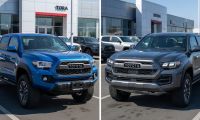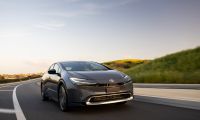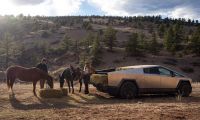Gordon Johnson claims Ford has a battery advantage overall:
"It looks like Ford actually has an advantage in battery technology," says @GordonJohnson19 on $F vs. $TSLA. "There's literally twenties of cars coming that are going to challenge Tesla. They are losing market share." pic.twitter.com/Bk8TvpIX5A
— Squawk Box (@SquawkCNBC) May 24, 2021
Gordon Johnson claiming Ford has a battery advantage by kWh:
If a lighter car that has a 61kWh li-ion battery costs $40K after yrs of “innovation”/“disruption” (Model 3 SR+) vs. a much heavier truck with a 170kWh li-ion battery (i.e., the $39.9K F-1 Lightning) right out the gate, who is better at battery tech/car manufacturing? I’ll wait?!
— Gordon Johnson (@GordonJohnson19) May 25, 2021
Interesting that Gordon Johnson is using kWh to determine who has the advantage. A kWh is simply this: a measure of how much energy you’re using, a unit of measurement that equals the amount of energy you would use if you kept a 1,000 watt appliance running for an hour. Does using more energy mean cheaper, faster, longer range? And what is each company spending to produce each car?
There was recent news of a huge battery factory being built near Tesla Giga Shanghai for 4680 cells. Tesla certainly seems to have been making and dealing with batteries longer than Ford, but let's look at the details to see for sure.
The Ford F-150 Battery and Other Statistics
From Gordon Johnson:
- 170 kWh lithium-ion battery
- Base cost $39.9K
What Gordon Johnson didn't say from Ford's website:
- Base cost is actually $39,974
- Highest end model is around $90,474
- First shipments reported to begin in Spring, 2022
Other details from insideevs.com
- 125 kWh total (Standard-Range Battery)
- 170 kWh total (Extended-Range Battery)
- Standard-Range Battery with expected EPA range of 230 miles (370 km)
- Extended-Range Battery with expected EPA range of 300 miles (483 km)
The battery weighs over 1,800 pounds by itself. This appears to be for the standard range battery, but no details were mentioned except a capacity around 112 kilowatt-hours, which is closer to the standard range Ford F-150
The Tesla Model 3 Battery and Other Statistics
From Gordon Johnson:
- 61 kWh lithium-ion battery
- Base cost $40K
What Gordon Johnson didn't say from Tesla's website:
- Base cost is $39,990
- Highest end model is $56,990
- Standard-Range Battery with expected EPA range of 263 miles (423.257 km)
- Long-Range Battery with expected EPA range of 353 miles (568.098 km)
- Is shipping right now in countries around the world
Other details
- Long-Range battery weights about 1,060 pounds
- 54 kWh total (Standard-Range Battery)
- 79.5 kWh total (Extended-Range Battery)
As a side note, a Tesla Model S Plaid Long Range, according to the Tesla website, has an estimated 412 miles of range!
Let's compare the two batteries, cost, and range
Model
Cost
Range
kWh
Battery Weight
Standard Range F-150
$39,974
230 miles (370 km)
125 kWh
1,800 lbs. *
Standard Range Model 3
$39,990
263 miles (423.257 km)
54 kWh
714 lbs. *
Long Range F-150
$90,474
300 miles (483 km)
170 kWh
1,800 lbs. *
Long Range Model 3
$56,990 *
353 miles (568.098 km)
79.5 kWh
1,060 lbs.
- * I calculated the weight of the Standard Range Model 3 battery by taking the percent smaller it was than the Long Range Model 3 battery from Wikipedia data (4,416 long range cells -vs- 2,976 standard range cells)
- * I could only find one article stating the weight of the Ford F-150 battery, but it was not specific to which range version, so I have used 1,800 lbs. for both versions.
- * I took the highest cost Model 3 (the Performance version) and used it in the comparison for the Ford F-150's most expensive version, even though the Long Range Model 3 is a little less expensive.
Conclusions
Tesla Standard Range Model 3:
- Is about the same cost as Ford Standard Range F-150
- Has over 12.6% more range than Ford Standard Range F-150
- Ford F-150 has 2.3 times the kWh
- Battery weighs 61% less than the Ford F-150 battery
Tesla Long Range Model 3:
- Cost about $33,484 less than Ford Long Range F-150 (or Ford's best F-150 model)
- Has about 15% more range than Ford Long Range F-150 (or Ford's best F-150 model)
- Ford F-150 Long Range (or Ford's best F-150 model) has 2.14 times the kWh
- Battery weighs 41% less than the Ford F-150 battery
Many sources of information
There's many sources of information here. I tried to find reputable websites, including the Ford and Tesla websites to gather this information, but there certainly seems to be some discrepancies on actual numbers for the kWh of each vehicle, along with range numbers.
Information I Wish Tesla and Ford had
I would like to see Tesla state kWh for each of its vehicles on its website so that it can be compared to other electric vehicles. Even if Tesla just estimates this, that is fine. I'd also like it easily accessible to see the weight and dimensions of the battery for the Tesla vehicles - and any other electric vehicles out there. This is just for transparency, which I think is important in anything. And it makes it easy to compare who is most efficient compared with weight and dimensions. Presently, the information is difficult to find.
Tesla certainly seems to have more efficiency with its batteries, size/weight of batteries, cost, and range, leading me to conclude that Tesla has the advantage here. If Ford was able to produce more range from its batteries and have smaller batteries and better cost than Tesla, I would conclude that Ford has the advantage. But kWh alone is not enough to determine who has the advantage.
Finally, without knowing what each company is spending on the battery and car, it's tough to see what the profit margins are here. When the CyberTruck comes out, we'll be able to do a better comparison than the heavier F-150 electric truck to the lighter Tesla Model 3.
Leave your comments below, share the article with friends and tweet it out to your followers.
Jeremy Johnson is a Tesla investor and supporter. He first invested in Tesla in 2017 after years of following Elon Musk and admiring his work ethic and intelligence. Since then, he's become a Tesla bull, covering anything about Tesla he can find, while also dabbling in other electric vehicle companies. Jeremy covers Tesla developments at Torque News. You can follow him on Twitter, Facebook, LinkedIn and Instagram to stay in touch and follow his Tesla news coverage on Torque News.
Set Torque News as Preferred Source on Google












Comments
Happy to see actual analysis
Permalink
Happy to see actual analysis based reporting. How refreshing! Thank you for holding the fudsters accountable.
Happy to hold FUDsters
Permalink
In reply to Happy to see actual analysis by intothefuture (not verified)
Happy to hold FUDsters accountable :)